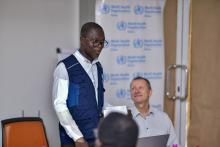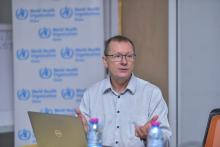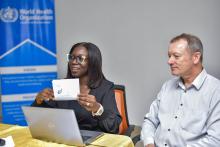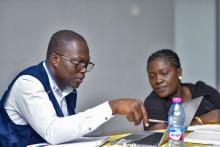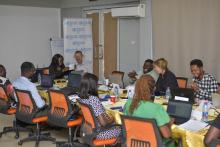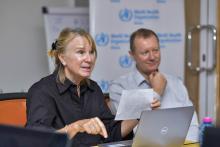WHO supports researchers turn AMR evidence into action in Ghana
Antimicrobial resistance (AMR) is one of the world’s gravest health threats, undermining progress in treating infections, threatening lives, livelihoods, and economies. In Ghana, where AMR touches human health, agriculture, and the environment, translating research into action is critical. Yet too often, valuable scientific findings remain locked in journals, inaccessible to those who shape policies and practices.
To bridge this gap, Ghana hosted the fourth module of the Structured Operational Research and Training Initiative (SORT IT) from 15–19 September 2025, focusing on effective communication of research findings. The training, supported by the Special Programme for Research and Training in Tropical Diseases (TDR), WHO, and national partners, brought together mentors and researchers who had previously completed SORT IT cycles from across the country.
The module trained participants to translate complex research into clear, actionable messages for policymakers, health workers, and communities. Through lectures, peer reviews, mentoring, and practical exercises, participants developed evidence briefs, stakeholder maps, lightning presentations, and elevator pitches tailored for real-world influence.
WHO Representative to Ghana, Dr. Fiona Braka, underscored the importance of turning science into policy impact.
“AMR is a silent pandemic. Research alone is not enough—what matters is how well findings are communicated and used to protect lives. By equipping Ghanaian scientists with communication skills, we are ensuring that evidence doesn’t stay on the shelf but drives decisions that strengthen health systems,” she said.
Trainers also emphasized the added value of communication in operational research. Robert Terry; Knowledge Management expert and a SORT IT trainer, explained, “Our goal is to demystify science communication. A clear evidence brief, a concise pitch, or a well-targeted presentation can be as powerful as the research itself in influencing change. This module gives participants practical skills to make their science matter beyond publications.”
For participants, the experience was eye-opening. Dr Nana Akua Abruquah, a Medical Officer at Kwame Nkrumah University of Science and Technology Hospital, reflected, “This module showed me how to move beyond writing for journals. I now know how to engage directly with decision-makers, present evidence in plain language, and ensure that my work contributes to improving practice at the frontlines of care.”
Mrs Karyn Ewurama Quansah, a Research Scientist at the Council for Scientific and Industrial Research, Water Research Institute (CSIR-WRI) also shared her excitement about the training and its impact on her work.
“AMR cuts across human, animal, and environmental health. This training has equipped me to communicate my findings not just to scientists, but also to farmers, regulators, and the public. That’s how we can collectively tackle the challenge”, she said.
By the end of the week, participants had produced policy-relevant communication tools and gained the confidence to engage diverse stakeholders. Their outputs will support Ghana’s ongoing efforts to address AMR, aligning with the One Health approach and national strategies.
The training underscored that tackling AMR is not just about producing evidence—it is about ensuring that evidence is heard, understood, and acted upon.
For Additional Information or to Request Interviews, Please contact:
Abdul-Lahie Abdul-Rahim Naa
Communications Officer
WHO Ghana Country Office
Email: abdullahiea [at] who.int (abdullahiea[at]who[dot]int)
Tel: +233 20 196 2393




